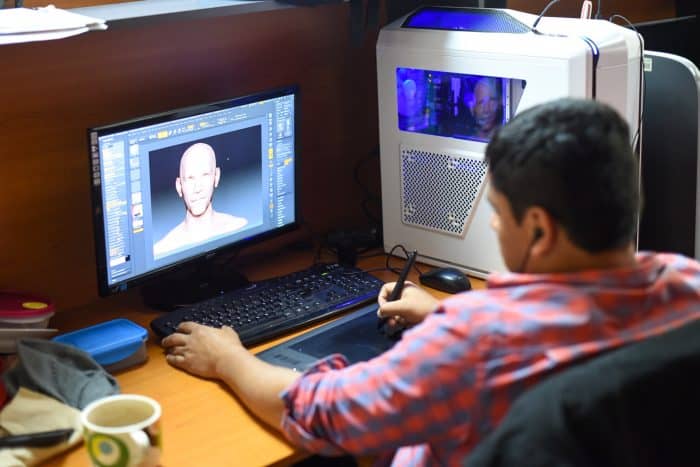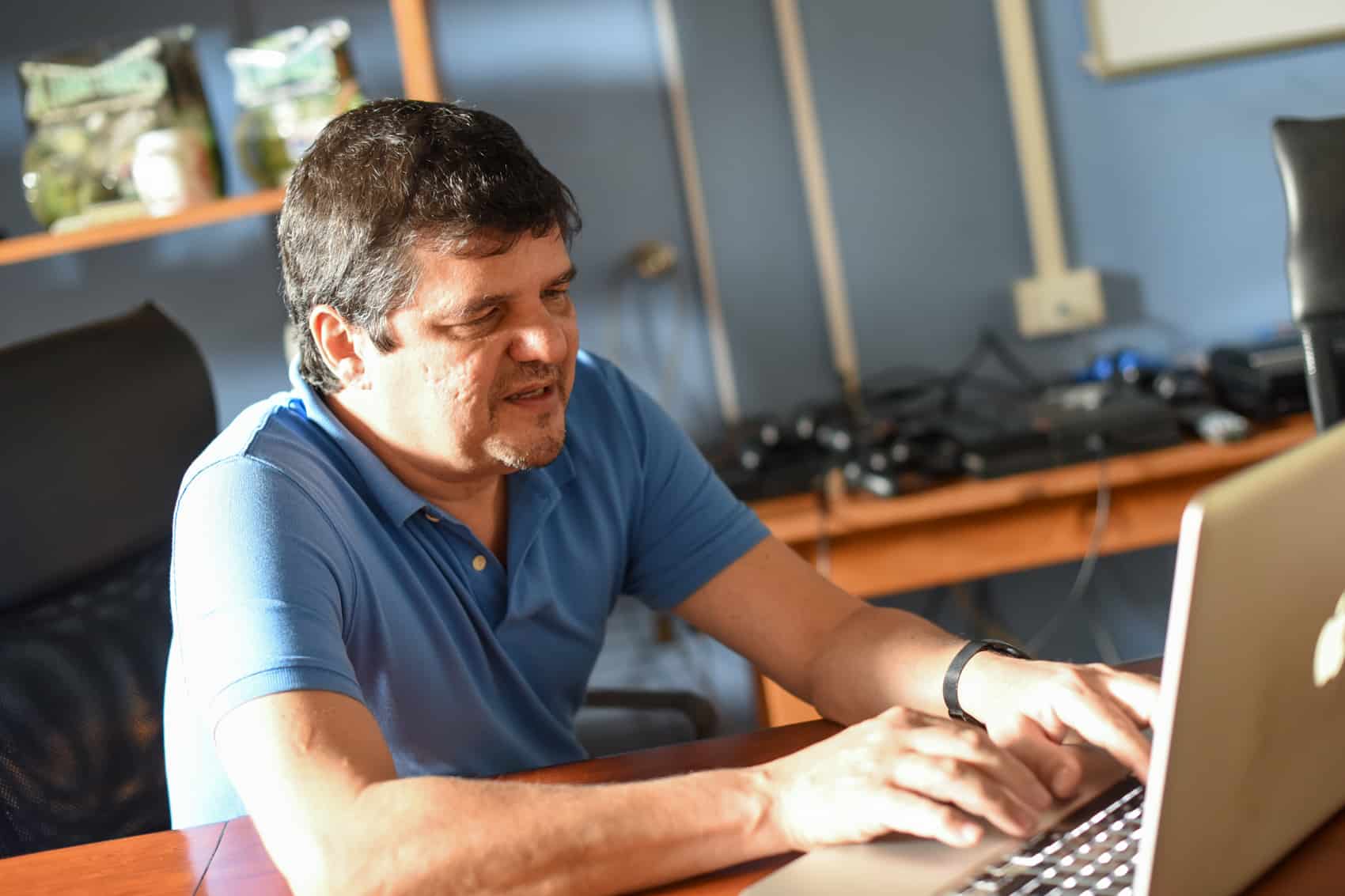Claudio Pinto, 56, studied electrical and computer engineering at the University of Wisconsin-Madison and has forged a career as a successful entrepreneur, but in 2005 a suggestion from his 7-year-old son took his career into creative territory: he founded the video game studio Fair Play Labs, which has become an important player on the Costa Rican scene. Fair Play has created games of their own, such as Ecovolution, WackyLand’s Green, Boss!, Cube Head, Journey to Real Madrid, Soul Ascension, Chuck’s Challenge 3D and Color Guardians. In addition, the studio is a Licensed Developer that works with companies such as Disney, Nickelodeon, Mattel, Microsoft, Sony, Nintendo, Apple and Android. Their video games are available for different consoles such as Xbox, Play Station 4, Play Station Portable (PSP), Play Station Vita, Nintendo DS, Game Boy Advance and Ouya.
On a Thursday afternoon The Tico Times visited Fair Play Labs’ offices in Zapote and spoke with Pinto. Excerpts follow.
Why did you create Fair Play Labs?
When my son, Daniel, was 7 years old we liked to connect our computers and play video games. We would compete against each other. One day Daniel asked me, ‘Wouldn’t you like to have another job?’ and I asked him, ‘Doing what?’ His answer was, ‘Creating video games.’ He said it would be very easy: he would design them and I would program them. I told him that I was too busy working at Exactus [a company Pinto founded], but he told me we could do the work on Saturdays.
A few weeks later, certain things happened. I believe more in causalities than coincidences. At work, I interviewed a girl who had just graduated from computer engineering at the Tecnológico de Costa Rica (TEC), and she told me that her dream was to make video games. About a week after that, I met another girl who had just graduated from digital animation at a college in the United States; at that time, digital animation majors did not exist here in Costa Rica. My son and I are Claudio and Daniel, and these girls are called Claudia and Daniela. That was very weird. Life was telling me something, so I started working as Daniel had suggested, at night and on the weekends. After a year and a half, I told myself this was what I wanted to dedicate my life to. I left Exactus 11 years ago. We were a couple of people working at Fair Play Labs. Now we’re a team of 50 people or more, mostly artists and computer engineers.
While developing the studio, what challenges did you face?
Credibility. To develop video games you need access to the consoles and the tools provided by the manufacturers: for example, Sony for Play Station, Microsoft for Xbox and Nintendo for its consoles. Today, smartphones also work as consoles. Apple and Android have ventured into this. To develop video games you need special tools and access to the information that only those companies provide, and to be able to do that you have to be a Licensed Developer. Eleven years ago we applied to Nintendo. I thought that my 19 years of experience working with boring software, for businesses, would carry over, but they did not respond. I spoke on the phone with a woman and she asked me two things: how many games have you published, and how many people working with you have worked on published games? The answer to those questions was, “None.” She told me that we had no experience that would allow us to aspire to make video games. You can solve the experience problem in a country where there’s already a developing video game industry and experienced people, but that was not the case with Costa Rica. We tried to create a video game for Game Boy with tools in the public domain, but it was not possible, so we focused on getting hired by companies.

How did you get the Licensed Developer status?
Apple did something that changed the video game world: to allow anyone to develop video games after purchasing a $99 license. That year we released our first video game called WackyLand’s Green. We kept releasing games, first for iPhone and then for Android. Curiously, that year, as a reaction towards Apple, I’d say, Sony opened a program of incubation for Latin America, because they did not have any License Developers here. This program ended the vicious circle where these companies wanted you to have experience, but did not provide you with the tools to do so. The people from Sony spoke to us and asked us if we wanted to participate in the program. That was great because they gave us a PSP developer. We got that, so we released the game we had already done for iOS and released it for PSP. We graduated and became Licensed Developers for the first time. That was in 2009. Afterwards we got Play Station 3, Play Station Vita and Play Station 4.
Can you tell us about your games?
Our oldest game is Ecovolution, which we began making for Game Boy and never published. WackyLand’s Green was the first game we released for iOS. A later release, Boss!, is about getting the best hero at the end of each level. He is attacked by dwarves and eats princesses, who serve as a source of stamina. The iOS version was published by Chillingo, a huge video game publisher. They published Angry Birds and Cut the Rope. With that we’ve had success. We released it for PSP and Play Station Vita.
Journey to Real Madrid is a football free-kicks game we made along with a studio in Los Angeles. It’s an official Real Madrid game. Cristiano Ronaldo, Zinedine Zidane and Mesut Özil appear on the game. It’s pretty cool because it goes through each of the players’ lives. It shows them as children, all the way until they get to the Santiago Bernabéu stadium. All of the players had to approve these concepts. Most of them come from families with limited resources, so there are no photos of them when they were children. We had to imagine them as children, create them and get it approved by them.
Our most recent game was Color Guardians, which consists of moving your character and changing its color. It’s super fast and it gets difficult quickly. Another game we did for a company called Wild Tangent was Polar Bowler. You play with a polar bear who’s sitting on a tire and use it as a bowling ball. You can play on an alley on the free version. The version you can buy combines mini golf and bowling.
What games are you currently working on?
We did a prototype for a game about climate change that was taken to the Paris Climate Change Conference, COP21. It was a collaboration with the CETAV financed by a Franco-German cultural fund. They’ve now given us more money to develop it further. The first year was about making a prototype and a teaser. With this additional money, the idea is to find a sponsor that will finance the game’s development. It’s a game that is intended to be given as a gift. It’s about creating an experience.
A company from Lebanon hired us to create a new game about the women from the Sahel region of Sub-Saharan Africa. Girls from this area walk four hours to [a water source] and four hours back home with a water jug on their heads. They do it 365 days a year. It’s their job. They can’t study when they have to walk four hours endangering their lives, fighting against animals to gather water from a small hole. It’s a game to create consciousness about the topic.
Our “Weekend Arts Spotlight” presents Sunday interviews with artists who are from, working in, or inspired by Costa Rica, ranging from writers and actors to dancers and musicians. Do you know of an artist we should consider, whether a long-time favorite or an up-and-comer? Email us at kstanley@ticotimes.net.






